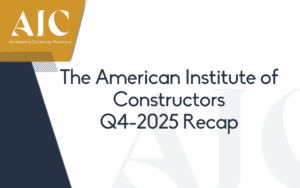Construction managers (CMs) carry a tremendous amount of responsibility on a daily basis. Everything from executing construction plans to ensuring worker safety falls under their care.
If you are a constructor who aspires to become a construction manager, then it’s important to find answers to what a construction manager does on a day-to-day basis. With this knowledge in hand, you’ll be better equipped to understand if this is the career path you want to pursue.
Let’s examine some of the most important responsibilities of a construction manager.
Inside The Daily Responsibilities of a Construction Manager
Construction managers must be skilled in how they manage the ins and outs of a construction project, while also keeping in mind the big picture at all times. They can’t solve a problem without also thinking through how their solution affects the totality of the project from a cost, time, quality, and safety standpoint.
For example, if multiple workers call out sick during a key phase of the project, a construction manager has to think through the proper solution to keep the project moving without creating safety issues by asking the available workers to perform duties they might not be comfortable with.
This is just one example of the challenges managers must address daily. Consider a few different categories of regular responsibility.
1. Execute the Construction Management Plans
Construction managers need to understand the plans for the project. This requires a deep understanding of the project drawings, timelines, budget, site conditions, materials, and equipment. Managers then need to be able to clearly communicate the plan to workers who will be carrying out the work to ensure that the right person is doing the right job in the right way.
Managers must monitor progress on a daily basis to ensure that the project is advancing toward completion according to the agreed construction schedule. Otherwise, the project could fall behind schedule, prompting dissatisfaction from owners.
Falling behind schedule will also place the construction manager in a difficult position of trying to find ways to catch up without sacrificing quality or safety. It’s best to avoid these situations so that you don’t have to contemplate taking shortcuts to satisfy the timeline.
2. Be Mindful of the Budget
The delivery of each construction project varies. One of the most common delivery methods is Construction Manager At-Risk (CMAR), also known as Construction Management At-Risk. In this delivery method, the Construction Manager assumes the risk of keeping costs within the agreed-upon budget.
In this method, the manager is responsible for managing his or her team of construction workers and for contracting directly with contractors and subcontractors to execute their portion of the work. The owner will pay for the budgeted costs. However, the manager must provide a cap on how much the owner will be expected to pay for the full scope of the work. This is called the guaranteed maximum price (GMP).
The construction company pays any incurred costs that exceed the GMP, which is why the constructor is at risk. Construction managers must be mindful of cost control to ensure that actual costs do not exceed budgeted costs. This is why the daily management of costs is crucial to support the big picture of achieving a financially successful construction project.
3. Take Care of Your People
Safety is of utmost importance at the construction site. Construction managers are responsible for a variety of safety-related issues to ensure that every worker returns home safely from the job site:
- Provide daily check-ins about the work to be done and the equipment to be used before the work begins.
- Schedule regular training to remind workers of how to execute tasks safely.
- Offer cross-training to workers to ensure they can safely perform multiple duties if a worker calls out sick or is re-assigned to another project.
- Communicate with contractors, subs, and the trades about safety issues.
- Routinely monitor safety issues at the job site.
- Receive feedback from workers about safety issues.
- Take steps to correct safety issues that you notice or others observe.
- Ensure compliance with OSHA safety standards for a construction site.
- Log safety issues and create reports capturing your safety record.
4. Pay Attention to Ethical Situations
Ethics is a critical responsibility for construction managers. Cutting corners by hiring unskilled labor or sacrificing quality in order to save costs will not pay off in the long run. Yes, construction managers need to be mindful of costs, but not at the expense of the owner or the project.
Managers have an ethical duty to ensure that owners receive a project that satisfies the contracted agreement. Otherwise, you risk creating future re-work, legal issues for the owner if the constructed structure is deemed unsafe, and lost business down the road due to poor reputation.
This is why construction managers need to fully understand their ethical responsibilities with project delivery so that they are equipped to intelligently take care of the daily responsibilities of a job site without placing the owner or their company at risk.
5. Handle Miscellaneous Items at the Construction Site
In addition to the main responsibilities of managing a construction site, there are other important duties that will help ensure a successful project.
– Rent waste dumpsters. Construction managers are typically responsible for renting roll-off dumpsters and other waste containers for the job site. Dumpsters provide workers with a centralized location to place waste and scrap. This will ensure the construction site remains clear of debris and waste to prevent safety issues.
– Communicate with visitors. Construction managers need to possess good communication skills! You will be asked to communicate with a variety of visitors that come on-site to review progress at the job site. Whether it’s the owner checking in, an OSHA inspector reviewing safety issues, or another third party requesting access to the site, you need to be able to answer questions and provide requested information.
– Report progress to management. Upper management will want to know progress at the job site. The role of a construction manager is to provide progress reports and other requested information on a daily, monthly, and/or quarterly basis. You will need to be mindful of the information that upper management is seeking so that you clearly communicate the appropriate information that satisfies their inquiry.
– Coordinate with other teams. At certain times during the project, you may experience a shortage of some materials or you may need to replace key equipment. You need to be able to communicate with the appropriate departments (e.g. procurement) to request new items. This requires a proactive approach so that you can provide your teams with enough lead time to order necessary items and have the items delivered to the job site.
Learn More About What a Construction Manager Does
We have touched on some of a construction manager’s primary and secondary duties. There are countless other responsibilities on a project-by-project basis.
To learn more about the role of a construction manager, we encourage you to subscribe to our email newsletter. Our monthly newsletter includes valuable information and resources that will help you grow your knowledge base as you continue to advance in your career as a constructor.
To sign up for our newsletter, simply drop your name and email address in the sign-up box below. We look forward to supporting you on your career path!




